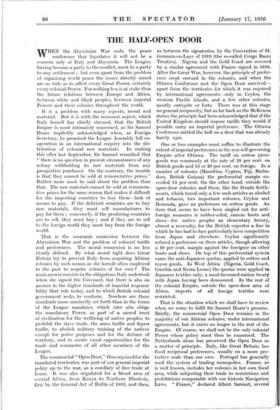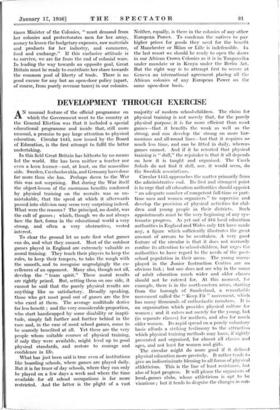THE HALF-OPEN DOOR
WHEN the Abyssinian War ends, the peace conference that liquidates it will not be a concern only of Italy and Abyssinia. The League,
having become a party to the conflict, must be a party to any settlement ; but even apart from the problem of organising world peace the issues directly raised are so wide as to affect every Great Power, certainly every colonial Power. For nothing less is at stake than the future relations between Europe and Africa, between white and black peoples, between imperial Powers and their colOnies throughout the world. of organising world peace the issues directly raised are so wide as to affect every Great Power, certainly every colonial Power. For nothing less is at stake than the future relations between Europe and Africa, between white and black peoples, between imperial Powers and their colOnies throughout the world.
It is a problem with many aspects, moral and material. But it is with the economic, aspect, which Italy . herself has chiefly stressed, that the British Empire is most intimately concerned, as Sir Samuel Hoare implicitly acknowledged when, as Foreign Secretary, he promised the League Assembly full co- operation in an international enquiry into the dis- tribution of colonial raw materials. In making this offer last September, Sir Samuel remarked that " there is no question in present circumstances of any colony withholding its raw materials from any prospective purchaser. On the contrary, the trouble is that they cannot be sold at remunerative prices." Rather more must be said about the problem than that. The raw materials cannot be sold at remunera- tive prices for the same reason that makes it difficult for the importing countries to buy them—lack of means to pay. If the deficient countries are to buy raw materials, they must sell manufactures to pay for them ; conversely, if the producing countries are to sell, they must buy ; and if they are to sell to the foreign world they must buy from the foreign world.
That is the economic connexion between the Abyssinian War and the problem of colonial tariffs and preferences. The moral connexion is no less clearly defined. By what moral right does Great Britain try to prevent Italy from acquiring African colonies by such means as she herself often employed in the past to acquire colonies of her own ? The main answer consists in the obligations Italy undertook when she signed the Covenant, but there is also an answer in the higher standards of imperial responsi- bility that rule today, and to which British colonial government seeks to conform. Nowhere are those standards more succinctly set forth than in the terms of the League mandates, which inter alia oblige the mandatory Power, as part of a sacred trust of civilisation for the wellbeing of native peoples, to prohibit the slave trade, the arms traffic and liquor traffic, to abolish military training of the natives except for police purposes and for the defence of territory, and to secure equal opportunities for the trade and commerce of all other members of the League.
• The commercial " Open Door," thus enjoined for the mandated territories, was part of our general imperial policy up to the war, as a corollary of free trade at home. It was also stipulated for a 'broad area of central Africa, from- Kenya to Northern Rhodesia, first by the General:Act of Berlin of 1885, and then, as between the signatories, by the Convention of St. Germain-en-Laye of 1919 (the so;called Congo Basin Treaties). Nigeria and the Gold Coast are covered by a similar agreement with France signed in 1898. After the Great War, however, the principle of prefer- ence crept onward in the colonies, and when the Ottawa Conference met the Open Door surviyed- apart from the territories for which it was enjoined by international agreements—only in Ceylon, the
western Pacific islands, and a few other colonies, mostly entrepots or forts. There was at this stage
no general reciprocity, but as far back as the MeKenna duties the principle had been acknowledged.that if. the United Kingdom should impose tariffs they would if possible carry an imperial preference. The Ottawa Conference rattled the bolt on a door that was already barely ajar.
One or two examples must suffice to illustrate the extent of imperial preferences in the non-self-governing Empire after Ottawa. The tariff on cotton piece- goods was commonly at the rate of 10 per cent. on British goods and 15 or 20 per cent. on foreign. In a number of colonies (Mauritius, Cyprus, Fiji,' Barba- does, British Guiana) the preferential margin ex- ceeded 15 per cent. On the other hand; outside the open-door colonies and those, like the Straits Settle- ments, which taxed only a few such articles as alcohol and tobacco, two important colonies, Ceylon and Bermuda, gave no preference on cotton goods. An item that seems to have been singled out for anti- foreign measures is rubber-soled, canvas boots and shoes—for native peoples an elementary luxury, almost a necessity; for the British exporter a line in which he has had to face particularly keen competition from Japan and elsewhere. Ceylon significantly refused a preference on these articles, though allowing a 10 per cent. margin against the foreigner on other boots and shoes. On top of this preferential system came the anti-Japanese quotas, applied to cotton and rayon goods. In West Africa (Nigeria, Gold Coast, Gambia and Sierra Leone) the quotas were applied to Japanese textiles only, a most-favoured-nation treaty with Japan having been denounced. In the rest of the colonial Empire, outside the open-door area of Africa, imports of all foreign textiles were restricted.
That is the situation which we shall have to review when we come to fulfil Sir Samuel Hoare's promise. Briefly, the commercial Open Door remains in the majority of our African colonies, under international agreements, but it exists no longer in the rest of the Empire. Of course, we shall not be the only colonial Power whose policy must then be examined. The Netherlands alone has preserved the Open Door as a matter of principle. Italy, like Great Britain, has fixed reciprocal preferences, usually on a more pro- tective scale than our own. Portugal has generally used the system of trading monopolies. Fiance, as is well known, includes her colonies in her own fiscal area, while subjecting their trade to restrictions and prohibitions coniparable-with our historic Navigation taws. " France," declared 'Albert Sarraut,' several times Minister of the Colonies, " must demand from her colonies and protectorates men .for her army, money to lessen the budgetary expenses, raw materials and products for her industry, and commerce, food and exchange." If this exclusive attitude, is to survive, we are far from the end of colonial wars. In leading the way towards an opposite goal, Great Britain must be ready to contribute her share towards the common pool of liberty of trade. There is no good excuse for any but an open-door policy (apart, of course, from purely revenue taxes) in our colonies. Neither, equally, is there in the colonies of any other European Power. To condemn the natives to pay higher prices for goods they need for the benefit of Manchester or Milan or Lille is indefensible. In the last resort we should be ready to open the doors in our African Crown Colonies as it is in Tanganyika under mandate or in Kenya under the Berlin Act. . But the right way is to attempt first to secure at GeneVa an international agreement placing all the African colonies of any European Power on the same open-door basis.







































 Previous page
Previous page